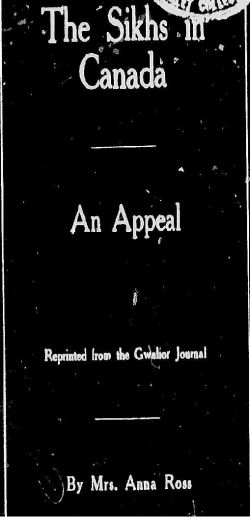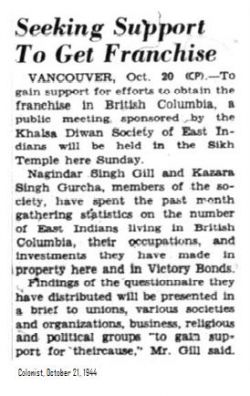NEWS RELEASE about SolidarityMediaIdeasEducationArts posted on April 7, 2011 by Satnam Singh Sangra
Happy Citizenship Day to all South-Asians!
64 years ago, on April 2, 1947 a long, effective and sustained struggle lead by the Sikhs culminated in all South-Asians attaining the right to Vote in Canada.
The first South-Asians started arriving in Canada in the early 1900’s and by 1907 their population in British Columbia had soared to well over 5000. A majority (~95%) of these newcomers were the Sikhs from Punjab. This large influx of dark skinned turban wearing Sikhs, in addition to other Asians, sparked outrage among the locals and government officials who feared an Asian invasion. In 1907 this anti-Asian anger spilled onto the streets and caused a lot of damage to Chinese and Japanese quarters of Vancouver in what was known as the anti-Asian riots. To appease the angry public the government moved immediately to check Sikh immigration. The British Columbia legislature and Canadian Government passed many discriminatory laws. On March 26th, 1907 The British Columbia legislature unanimously agreed to debar the Sikhs (and all natives of India) from exercising their right to vote in municipal, provincial and federal elections. This decision tremendously disadvantaged the Sikhs by effectively barring them from becoming practicing professionals such as doctors, lawyers, teachers and engineers.
The entire house - in which the opposition parties were often at a loggerhead with one another – agreed that disenfranchising the Sikhs was a step in the right direction. In support of their decision it was said that the Sikhs would never be able to assimilate into Canadian society due to their foreign language, laws and customs.
According to Canadian law, British Subjects were eligible for Canadian citizenship after living in Canada for a minimum of 6 months. Since India was a British Colony at that time, the Sikhs too, were British Subjects. The discriminatory actions of the provincial government caused much resentment among local Sikhs. Under the Aegis of the Khalsa Diwan Society, the premiere organization of the Sikhs - and representative of Hindu and Muslim interests as well - a struggle was launched to protest the unfair treatment of the South-Asians. From the period between 1908 and 1919 the Sikhs sent several delegations to Ottawa, London and India in hopes of gaining support for their cause. The Sikhs also engaged in letter writing campaigns to local media apprising the general public of their concerns. All the efforts of the Khalsa Diwan Society bore little fruit regarding citizenship.
By the 1920’s discriminatory laws of the Canadian government resulted in a severe decline in the Sikh population. A vibrant community of almost 6000 in 1908 was reduced to a mere 1200 in the early 1920’s. Despite a sharp decline in their numbers and a hostile government the Sikhs were a thriving community. According to the report on Oriental Activities of 1925, the Sikhs owned six lumber companies, seven logging camps, two shingle factories, two grocery stores and twenty five farms. The Sikhs were determined to make Canada a home for all South-Asians and they didn’t give up hope. In 1927, the Sikhs of the Khalsa Diwan Society gave a memorandum to Lord Willingdon (a Govt. official from England) apprising him of the discrimination faced by the Sikhs and asking for his intervention.
Despite the great depression of the 1930’s the Sikhs’ hopes for citizenship were very much alive. In 1935 their aspirations for citizenship were brought forth in the British Columbia Legislature by the Cooperative Commonwealth Federation. The CCF tabled a motion to grant voting rights to all Orientals including the Sikhs. It was ridiculed by the honorable members and ruled out of order. During these trying times the desire for citizenship kept burning in the hearts of the Sikhs and their premiere organization, the Khalsa Diwan Society.
On September 27, 1942 the leaders of the Khalsa Diwan Society decided to regroup and restart an organized campaign for voting rights. On this day the society stated that the Sikhs are willing and ready to sacrifice their lives for the nation. They requested the Canadian government to grant them voting rights. In 1942 the society started correspondence with the Prime minister’s office in Ottawa and in 1943 the Sikhs arranged for meetings with the Provincial cabinet in Victoria. They laid stress on the fact that if Sikhs are good enough to serve the country in military uniform they deserve the right of citizenship.
The campaign for voting rights suffered several setbacks. The labor minister of British Columbia, George Pearson stated that the East Indians do not deserve voting rights because they are “unreliable, dishonest and deceitful” people. Despite this the Sikhs kept their campaign for citizenship alive. They surveyed the entire community and with powerful results regarding Sikh contributions to Canadian society they started a letter writing campaign. This campaign proved very successful at gaining wide spread support among the common people.
As the momentum gained, the Cooperative Commonwealth Federation tabled a motion to grant franchise to the East-Indians in the British Columbia Legislature on Mach, 27, 1945. The motion went to vote and was defeated by a margin of only two votes. In his statement to the press the charismatic general secretary of the K.D.S, Naginder Singh stated that this was a great victory and vowed to carry on the fight for the franchise to its logical end.
The Sikhs stepped up their efforts and started canvassing social organizations, church groups, service clubs and unions to support their bid for citizenship. In response to the stepped up pressure from the Khalsa Diwan Society, the British Columbia Government set up a committee to recommend any changes to the election act of British Columbia. The Khalsa Diwan Society made an impressive presentation to the committee on behalf of the South-Asians (Hindus, Muslims and Sikhs). The committee recommended changes to the election act and on April 2nd 1947 the British Columbia legislature voted in favor of granting franchise to the South-Asians!
The rest is history…Happy Citizenship Day!
The site for the Vancouver local of The Media Co-op has been archived and will no longer be updated. Please visit the main Media Co-op website to learn more about the organization.






Comments
Thanks for posting this
There's a lot of history in this province that never gets taught in our institutions of learning, and even if it is, you definitely need to dig deep to find it. Thanks again.
Interesting Article!
Wow theres a lot of information in this article that I never heard about. I have learnt a lot about the Japanese and Chinese oppression, but never about the East Indian community. Thanks for this article, it was very interesting and informative! Love reading your articles!!